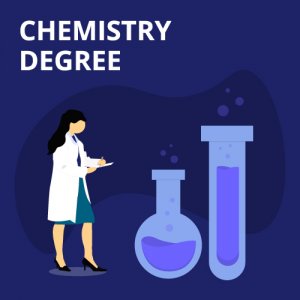What Kind of Accreditation Should My Degree Program Have?
To be sure that future employers will be interested in your degree, it is important to know that your school has the appropriate accreditation.
For any higher education discipline, particularly for Chemistry, accreditation is crucial when choosing an institution.
The college or university is eligible for financial support if the Department of Education has recognized an association that provided the accreditation.
First of all, accreditation shows that an educational institution adheres to the standards.
Secondly, the program is relevant and continues to expand in its field.
There are institutional and programmatic accreditation processes.
One is required for schools, the other for a specific discipline and degree program.
Regional Accrediting Agencies
Regional and national accreditation agencies can provide institutional accreditation.
In short, regional accreditation agencies enhance reputation and credibility.
When studying the conditions of colleges and universities, it is advisable to obtain a “stamp of approval” from one of these accreditation agencies depending on the region:
- The Higher Learning Commission
- Middle States Commission on Higher Education
- New England Association of Schools and Colleges
- Northwest Commission on Colleges and Universities
- Southern Association of Colleges and Schools Commission on Colleges
- Western Association of Schools and Colleges
National Accrediting Agencies
As regards national accreditation agencies, the situation is different.
Sometimes, an accreditation agency that specializes in a specific program is important.
Some employers will require you to obtain a degree in a specific program from a national accreditation course.
For example, a career in pharmacy or pharmacology requires special education.
If you plan to get a Ph.D. in pharmacy, you need to complete your degree, which accredited by the pharmaceutical education accreditation board.
At the same time, many chemistry students are looking for permission from one of the regional accreditation associations mentioned above to pursue a bachelor’s or master’s degree.
It is clear that this is evidence of the program compliance with the quality and reliability standards established by the Department of Education in Chemistry.
Chiefly, the database of the Department of Education contains all accredited companies within its competence.
If you know about accreditation, you can consider several options for obtaining a degree.
What Kinds of Chemistry Degrees Are There?
Associate Degree in Chemistry
Traditionally, an associate chemistry degree is a two-year 60-credit program.
During that time, you will gain basic knowledge of the different areas in your discipline such as organic chemistry, molecular chemistry, and biochemistry.
At the same time, you will also study related subjects including mathematics and physics and biology.
During the Associate Degree program, you will also be able to perform simple laboratory work.
After that, you will have access to a job as a junior specialist in a medical laboratory for a laboratory technician or as a junior chemist.
It’s also a good basis to continue your Bachelor in Chemistry education.
What Courses Will You Take?
- General Chemistry
- College Physics
- Organic Chemistry
- Calculus and Analytic Geometry
- Inorganic Chemistry
- General Chemistry Laboratory
Bachelor’s Degree in Chemistry
A 120-credit bachelor’s degree program in chemistry usually takes four years.
It offers comprehensive development in mathematics and science.
In addition to studying biology, physics, and mathematics.
You will learn about the components of chemistry such as physical, organic and inorganic chemistry.
You also take math courses in computation, higher mathematics, and differential equations.
The most important part of your research program is working in the laboratory.
Here you will learn about different features of chemical research and experiments on the practical experience.
You can apply this in your career as an analyst chemist in a consumer research company, or as a taxonomist or forensic scientist.
What Courses Will You Take?
- Introduction to Research
- Physics for Scientists and Engineers
- Cell Structure and Function
- Techniques of Chemical Measurement
- Experimental Physics
- Differential Equations
- Multivariable Calculus
- Physical Chemistry Lab
What’s the Difference Between a BA and a BS in Chemistry?
Typically, a Bachelor of Arts degree in chemistry (BA) combines a scientific orientation with some liberal arts.
In turn, the Bachelor of Science (BS) in the field is engaged in deeper mathematical and scientific experiments.
Master in Chemistry
If you plan to become a chemistry professional, you need to get a master’s degree in this field.
During 2 years of study, you will study in-depth important aspects of chemistry and gain laboratory experience in environmental biochemistry analysis.
This will allow you to improve your research skills, which will affect your future work in this field.
With a master’s degree, you can work as a pharmacist in a pharmaceutical organization, as a harmful substance specialist in an environmental protection agency, or as a manufacturer’s chemist at work.
It can also be the next step towards a doctoral degree.
Because in order to move on to postgraduate studies you need to get a master’s degree and pass your thesis based on your own research.
What Courses Will You Take?
- Advanced Inorganic Chemistry
- Chemical Thermodynamics
- Advanced Organic Chemistry
- Advanced Methods in Structural Biology
- Advanced Physical Chemistry
- Complex Molecular Synthesis
- Instrumental Analysis Laboratory
- Master’s Thesis
Ph.D. in Chemistry
If you want to get a doctoral degree, you can continue your work in the field of research and education.
Totally, you would need 4 to 7 years of working.
Many people combine college or university research with career or teaching.
It is also a prerequisite for working in many areas related to them as a professional researcher.
If you are interested in a top position in health care, ecology, pharmacology, or the public sector, you must complete your doctoral program.
In this case, you will be able to contribute to the development of chemical research.
What Kind of Licensing or Certification Do You Need?
To get a job as a pharmacist, you will need a license.
For this, you will need to take a series of additional examinations and tests.
The list of exams and tests and the requirements for obtaining a license vary from state to state.
In most states, FPGEC (Foreign Pharmacy Graduate Examination Committee) certification is the official method for confirming this equivalence in education.
Thus, the applicants who have obtained FPGEC certification are eligible for the North American Pharmacist Licensure Examination NAPLEX and other licensing examinations required by the state in which they intend to practice.
Popular Degree Programs
What Can You Do With This Degree?
Your chemistry degree is the road to a multitude of exciting professions in the natural sciences, physics, and social sciences.
You can choose one of the best professions in this field:
- Agricultural and Food Science Technicians
- Agricultural and Food Scientists
- Anthropologists and Archeologists
- Atmospheric Scientists and Meteorologists
- Biochemists and Biophysicists
- Chemical Technicians
- Chemists and Materials Scientists
- Conservation Scientists and Foresters
Apart from the above mentioned, you might also consider the following:
- Economists
- Environmental Science and Protection Technicians
- Environmental Scientists and Specialists
- Epidemiologists
- Forensic Science Technicians
- Forest and Conservation Technicians
- Geographers
- Geological and Petroleum Technicians
- Geoscientists
- Hydrologists
- Medical Scientists
- Microbiologists
- Natural Sciences Managers
- Nuclear Technicians
- Physicists and Astronomers
- Political Scientists
- Psychologists
- Sociologists
- Survey Researchers
- Urban and Regional Planners
- Zoologists and Wildlife Biologists
How Much Can You Make With This Degree?
According to the Bureau of Labor Statistics, in 2019 employers offer the following basic wages for the best jobs in your field:
- Chemical Technicians — Mean annual wage of $48,160
- Forensic Science Technicians — Mean annual wage of $58,230
- Agricultural/Food Scientists — Mean annual wage of $64,020
- Environmental Scientists — Mean annual wage of $71,130
- Medical Scientists — Mean annual wage of $84,810
- Chemists/Materials Scientists — Mean annual wage of $78,330
- Chemical Engineers — Mean annual wage of $104,910
What Professional Associations or Societies Should You Join?
The best way to establish new connections in your field is to join a professional association.
Here you can also learn about useful seminars or contests and improve your personal knowledge.
Obviously, your chosen career path will determine which associations you decide to join.
Find out about chemistry associations that match your professional direction:
- American Association for Clinical Chemistry (AACC);
- American Chemical Society (ACS);
- American Society for Biochemistry and Molecular Biology (ASBMB);
- International Society for the Philosophy of Chemistry (ISPC).
Summary
Now you have a more particular vision of your chemistry career.
Choose your own path and start applying your talents in work.
The degree in chemistry allows you to choose one or more interesting directions.
It’s a great opportunity to realize your scientific potential and make own discovery.
See More Degrees
What can you do with a degree in...







